Dark Crusade Review
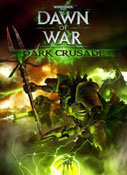
| Developer: | Relic Entertainment |
| Publisher: | THQ |
| Genre: | Real Time Strategy |
| Platform: | PC |
| Official Site: | http://www.dow-darkcrusade.com/ |
| Release Date: | November 2nd, 2006 (UK) |
| Reviewer: | Duncan Lawson (Sinna01) |
|
|
|
Warhammer 40,000: Dark Crusade is the latest in the much loved RTS series from Relic and published by THQ. For those not sufficiently pubescent or geeky, the 'Warhammer 40K' games are all set in a distant and very bloody future of constant war and strife, no friendly aliens at all, and the human culture has descended into superstitious militarism and psychotic xenophobia. Originally based on tactical board games and then novels and comics, Games Workshop's property has produced quite a number of very respectable titles. The Warhammer 40K world really lent itself to development into a hyperkinetic RTS, and Dawn of War proved to be enormous fun. Whereas there was an increasing trend of realism in the RTS area, favouring World War themes, Dawn of War shoved subtlety right out the battlewagon and went for a high-impact, high body count experience. Its simplified take-and-hold approach to resource collection is arguably the best approach yet developed, and much of the interface and system basics were directly transplanted into the truly excellent Company of Heroes.
Dawn of War was followed by Winter Assault, an expansion pack that offered an entirely new campaign with an entirely new playable force, which was more of exactly the same as before, and that was just fine, thank you. One of the elements that characterised these two precursor titles was the streamlining and attention to detail the player enjoyed. Forsaking trends in RTS to have as many playable factions as possible, Dawn of War had only the one, as did 90% of Winter Assault. This meant that each level was, as well as a bloody field of slaughter, particularly crafted to test the player in new ways, and also meant that there was a real sense of an overarching campaign and plot line.
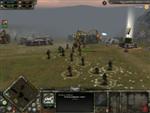
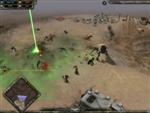
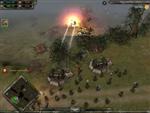
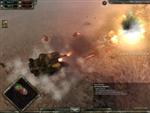
This simplification of features, and a concentration on core gameplay elements, was what made the series great, so it was a shade concerning that the latest instalment had decided to rock this happy gunboat by adding six playable races, persistent armies, and a turn-based campaign command system. It would not be the first time a good franchise has been sunk by an attempt to over-guild the lily, such as occurred to the later incarnations of the 'Command & Conquer' games.
These new features indeed do not add anything to the gameplay, but then again they do not really detract anything either, so it's hard to criticise them too strongly. The strategic map of the entire contested continent has become a popular feature, as implemented in most of the recent 'Lord of the Rings' RTS titles. Given that there are 6 factions on a map of about 15 separate areas, it is perhaps less of the Risk experience that the developers were perhaps aiming at, and more of a jostling grinder of attack and counter attack, an element that is more competently explored in the real-time parts of this strategy.
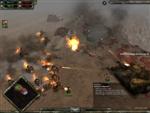
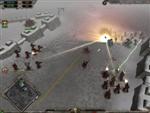
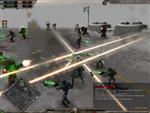
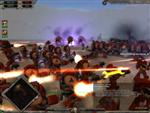
Slightly more tactical intrigue comes from the bonuses these territories impart when the shooting actually starts. In the good ol' days of RTS each level would start off with your little command building, maybe your hero, and perhaps a builder unit, and very grateful we all were too. In Dark Crusade each territory held will yield the player a certain amount of resources per turn, to be spent on buildings, units and heroes deployed in the field at the start. Specific territories will additionally grant bonuses of extra moves, greater resource requisition, and the ability to attack territory anywhere on the map.
My first campaign attempt saw me very slowly moving across the map, preferring to reinforce existing territories and let the other six computer players sort it out amongst themselves; I'd sit smug and mop up the last couple standing. This, as it turns out, is a foolish proposition. Winning sides will gain momentum, fielding greater resources at the start which can give a big push start to the war machine generating troops and armour. Sitting behind what I had assumed was quite a big row of guns, I waited for the coming tide of green skinned Orks to break against it, after which I'd venture out and clean up. What followed was a quick illustration in not only some of the improvements to the games engine but in history repeating. Dependent on how good your modern history is, picture myself as the French, my shiny defensive line as the 'Maginot Line', and the green skins as the approaching Nazi horde. Wine in hand, official military onions string across shoulders, I survey the field - Me: Bien s�r! Mes pistolets sont tr�s bons. Beaucoup de pistolets. Regarde! Voici les Orks. Il y a beaucoup d'Orks. Beaucoup de beaucoup d'Orks. Oh Merde.
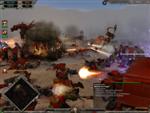
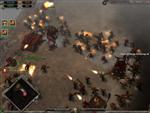
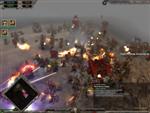
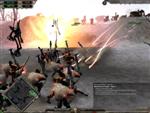
I was very quickly completely overrun by a crashing wave of enemy units that I have yet to see implemented in another title in scale. The excellent Company of Heroes is still top of the RTS tree, but even it did not have the sheer scale and impetus of slaughter that Dark Crusade has brought to the genre. Whilst your own force has population caps for infantry and armour, the computer cheats its way around this by enemy forces actually being comprised of two or three AI players of the same race targeting you. Such trickery is sometimes annoying, but in this case it means that the enemy can mobilize a great deal of units against you at once. The engines increased ability to display hundreds of persistent corpses as well means that choke points will soon turn into permanent firestorms, the ground literally covered with the corpses and wreckage of the fallen, endless lines of machine gun fire and heavy weapons making the kill zone alternately incandescent and obscured by smoke. In terms of battle violence and mayhem, Dark Crusade has made the wise move of not trying to emulate its celebrated cousin Company of Heroes, and has instead gone for a full-blown cartoonish mayhem more befitting its subject matter.
Nearly everything about the essential gameplay of Dark Crusade is identical to its franchise predecessors, so anyone familiar with those games will be immediately able to jump in. The playable races still include the fanatical, superhuman Space Marines, the numerous and cheap Imperial Guard, the fast breeding and fierce Ork horde, the gruesome legions of Chaos, and the particularly nancy and effete Eldar (read Elves). New to this particular fracas is the Tau - blue skinned alien do-gooders a bit more like humans are traditionally shown in sci-fi, handy with ranged weapons but with jaws of glass. Also joining the fight is the quite scary indeed Necrons, looking like a cross between a Camden Goth and the Terminator, slow as an iceberg but just as hard to kill. The races are sufficiently different to warrant the player curiosity, if not a full played through campaign with each.
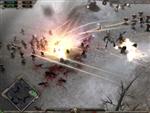
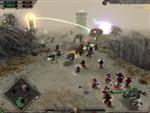
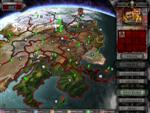
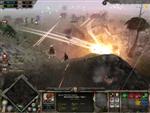
One of the losses made by the new campaign setup is in the development and technology progression that is a staple of the RTS genre. Everyone who plays RTS games will know the pleasure in finally having reached the level or uncovered the secret that will allow you to build your ultimate weapons and most bad-ass troopers. Dark Crusade allows all technology to be achieved from the word go, as long as you scrape together the required resource points. This is, of course, a realistic and grown up way to do things. It would be lunacy to send an army to war, but refuse to give out the useful guns until they had shot enough bad guys with the crappy ones. For veterans of the series, however, it can lead to a shade of dissatisfaction by the later stages of the game.
The graphics are also of a similar quality as before, which still holds up nicely today. Some engine tweaks have however increased the detail of units upon being zoomed in on. This is purely showing off and for the titillation of the player: the tactical view is already fairly close, with most decent skirmishes spilling out of the view easily, so zooming in on each unit is only an exercise in curiosity really. The sound quality is also excellent, as stylized as the battles themselves, favoring the fantastic over the accurate.
Summary
All in all, Dark Crusade is very good indeed, but the player cannot help but feel that it is only exactly as good as the original Dawn of War. Little additional development looks to have been put into the title, which, I know, makes me a hypocrite for simultaneously suggesting 'The game needed no guilding.' and 'Where the hell is my guilding?' It seems though that Relic has simply used materials it already had in place and probably had already spent the money on, and cunningly put them together in a new way, sufficiently different from the old way to keep the fans happy. Still, it's only fair to say that this is reflected in the retail price, this is a stand-alone expansion pack and therefore doesn't need Dawn of War to run but is priced reasonanbly like most other expansion packs.
I would recommend it to all existent fans of the series, but I would strongly suggest newcomers to try Dawn of War first. Of course, should you have bought Company of Heroes in the UK, you will have received a free copy of that and have no excuse.
Good stuff
- Epic violence and explosions
- Widely varied races
- Well balance core gameplay
- Improved graphics and engine
Not so good stuff
- Rehash of pre-existing gaming elements
- Lower production values
- Repetitive defensive actions in later levels
- Unrewarding progress trees
- Slightly baffling restriction on online play
Things You Should Buy Just After You Move Into New House
Packers and Movers Chennai Are the Best At Such An Affordable Price
Guide For Packing Up The Master Bedroom In An Organized Way
Girls Are You Packing For College? Then You Need To Read These Tips First.